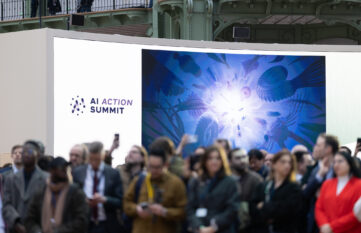Artificial Intelligence: Who shapes the digital future – and for whom?
This article first appeared here: Solution Spaces
Ulrich van Bebber explores the deep inequalities in AI development and why Europe must act now to ensure fairer AI policies.
Artificial Intelligence (AI) is far more than just a technology – it is a power factor. Yet the global distribution of computing power and data reveals a deep divide. While a handful of countries dominate development, the Global South risks being left behind. That’s why the German Federal Ministry for Economic Cooperation and Development (BMZ) is sending a strong signal for fairer AI policies with the “Hamburg Declaration”. How can AI be designed more fairly, and why must Europe act now?
Over 70% of global AI computing power is concentrated in five countries – all located in the Global North. This means that much of the Global South consists of so-called “compute deserts” – regions lacking the digital infrastructure needed to develop or contribute to their own AI models. On top of this, more than 90% of existing AI models rely on proprietary datasets from commercial providers, which are not publicly accessible. Those without their own computing infrastructure or sufficient access to data remain dependent and will struggle to achieve technological sovereignty in the long term!
AI is thus increasingly becoming a geopolitical power factor. While leading economic nations compete for technological dominance, many developing and emerging countries risk falling permanently and increasingly behind. Without investments in digital infrastructure, education, and ethical guidelines, access to AI technologies will remain unevenly distributed – and the question of how AI can be used responsibly will remain unanswered.
Acting responsibly and inclusively
The BMZ is committed to leveraging AI responsibly as a tool for sustainable development and unlocking its enormous – including economic – potential for all people. Together with the United Nations Development Programme (UNDP), we have launched the initiative “Responsible AI for the SDGs”. A key milestone of this initiative is the “Hamburg Declaration on Responsible AI for the SDGs”, which will be published on June 2, 2025. In this declaration, governments, businesses, and civil society actors commit – through voluntary self-obligations – to reduce digital inequality and create fair conditions for the development and use of AI, especially for the Global South. Several examples show how this can work.
FAIR Forward: AI for all
One example of how AI technologies can be made more accessible worldwide is the BMZ initiative FAIR Forward. Among other things, it provides open AI language datasets to enable local innovation for people in the Global South. More than 700 million people in Asia and Africa have already been able to use AI-supported applications:
For instance, the audio tool Audiopedia provides health information in the Indian language Telugu, specifically for women and young mothers. Information in local languages creates transparency and enables participation.
In Kenya, FAIR Forward developed a government chatbot with regional partners that “speaks” Swahili. This allows Kenyan citizens to easily access information about public services – a significant step toward citizen-friendly administration and strengthened democratic institutions.
Europe’s Responsibility
Technological innovation must benefit everyone. Fair AI can only be achieved if it is treated as a global common good. Open software, transparent algorithms, and inclusive governance structures are essential for this. Europe has a particular responsibility here – and also a unique opportunity to shape ethical and sustainable AI policies that go beyond geopolitical interests and focus on global justice. The BMZ is already showing through its initiatives that responsible AI is possible. But more is needed: the AI agenda must be further developed, partnerships strengthened, and it must be ensured that no one is excluded from this technological revolution. The Hamburg Declaration is an important step – but only the beginning. It is up to Europe to actively help shape a just digital future.
Get involved: https://www.bmz-digital.global/en/hsc/



